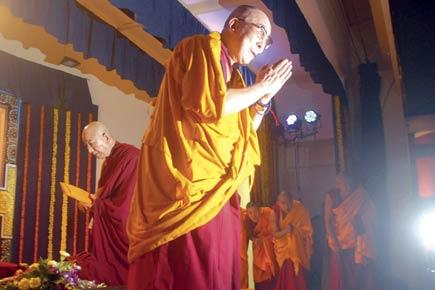In a discourse peppered by his characteristic wit and laced with gentle censure, His Holiness the 14th Dalai Lama, who is in the city to deliver a series of lectures on Buddhism, told a packed auditorium what it means to be truly secular

His Holiness the 14th Dalai Lama, who will turn 79 this July, was in town yesterday, to speak to a packed auditorium in Vidyavihar on ‘Living, Loving, Laughing and Dying – the Buddhist Way.’ And sure enough, there was plenty of laughter to go around, during the Nobel laureate’s address.
ADVERTISEMENT

Keeping his tone light and conversational as he spoke in the Somaiya College auditorium, the Dalai Lama dealt with weighty issues like achieving happiness through altruism, meditation, and dealing with negative emotions. Pic/Pradeep Dhivar
The exiled Tibetan spiritual leader had the audience in stitches, as he delivered his discourse the ‘science of happiness,’ a phrase he often uses to refer to his take on religion. “Do you mind moving a bit?” he asked the organiser, who was seated between him and the air-cooler.
After a strategic pause, he clarified, “I am not saying you are fat,” sporting a deadpan look. The audience roared in amusement. Later in the day, when talk turned to food and ethical eating, out popped another joke, this time about the debate on vegetarianism: “I myself eat meat around thrice a week [for health reasons, after becoming weak due to jaundice].
So, in our monastery, we have no goats, fishing or poultry (for meat). The entire monastery is vegetarian, except for the founder himself,” he joked. Keeping his tone light and conversational as he spoke in the Somaiya College auditorium, the Dalai Lama dealt with weighty issues like achieving happiness through altruism, meditation, accepting the impermanence of things, and dealing with negative emotions like jealousy, anger and fear.
Having advised his audience on how to achieve happiness at an individual level, the Dalai Lama went on to speak of the route that India, as a nation, would have to take to happiness, and suggested that it lay through peace. Taking note of India’s history of communal riots, he observed, in a mildly-worded censure: “In some pockets, there are problems there are over one billion people in India.
There are some mischievous people. Otherwise, we would not be human.” Without naming anyone, the Dalai Lama said that the government could ensure peace, and subsequently happiness, by upholding secularism enshrined in the Constitution.
The Dalai Lama, who has seen all of India’s prime ministers occupy the coveted seat in course of his illustrious life, hailed the recent Lok Sabha elections as proof that “democracy is profoundly established in India.” In a gentle reminder, though, he added, “India’s constitution is based on secularism.”
He said that the word secularism was prone to being misinterpreted as being hostile to religion, clarifying that “Secular ethics consist of warm-heartedness, concern for another’s well-being based on the feeling of oneness with all.” He added that peace would come about only if communal groups showed tolerance of the ‘other’.
“Keep your own traditions, but respect those of others,” he murmured, even if, he added, the ‘others’ were considered non-believers. “You Indians export ahimsa. But while you export it, you must also produce more of it,” the Dalai Lama jested, to laughter and applause. He suggested peaceful debates as a solution to removing suspicion and hostile intentions between communities.
 Subscribe today by clicking the link and stay updated with the latest news!" Click here!
Subscribe today by clicking the link and stay updated with the latest news!" Click here!






